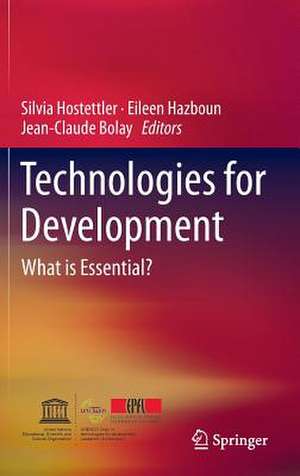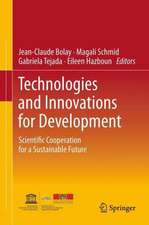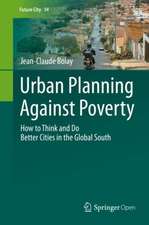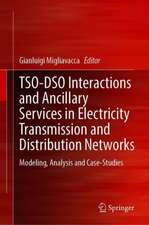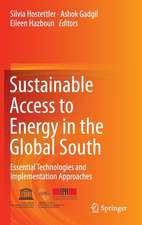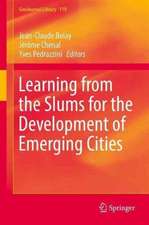Technologies for Development: What is Essential?
Editat de Silvia Hostettler, Eileen Hazboun, Jean-Claude Bolayen Limba Engleză Hardback – 17 mai 2015
It shows the development potential of technologies, and discusses successful processes to develop and deploy them, as well how to evaluate their impact. The introduction to the book begins with a reflection on key issues regarding technologies for development. The following four sections focus on; (i) Innovative Technologies for Development, (ii) Open Source-Open Access-Open Innovation, (iii) Medical Technologies for the Global South, and (iv) Impact Assessment of Technologies for Development. Individual chapters explore issues such as a need for solid standards for newly developed technologies, how to successfully up-scale technology to a larger region, and how to involve private industry in the development of a technology.
| Toate formatele și edițiile | Preț | Express |
|---|---|---|
| Paperback (1) | 941.82 lei 6-8 săpt. | |
| Springer International Publishing – 8 oct 2016 | 941.82 lei 6-8 săpt. | |
| Hardback (1) | 947.85 lei 6-8 săpt. | |
| Springer International Publishing – 17 mai 2015 | 947.85 lei 6-8 săpt. |
Preț: 947.85 lei
Preț vechi: 1155.91 lei
-18% Nou
Puncte Express: 1422
Preț estimativ în valută:
181.39€ • 196.97$ • 152.37£
181.39€ • 196.97$ • 152.37£
Carte tipărită la comandă
Livrare economică 22 aprilie-06 mai
Preluare comenzi: 021 569.72.76
Specificații
ISBN-13: 9783319162461
ISBN-10: 3319162462
Pagini: 200
Ilustrații: XVIII, 221 p. 41 illus., 30 illus. in color.
Dimensiuni: 155 x 235 x 20 mm
Greutate: 0.51 kg
Ediția:2015
Editura: Springer International Publishing
Colecția Springer
Locul publicării:Cham, Switzerland
ISBN-10: 3319162462
Pagini: 200
Ilustrații: XVIII, 221 p. 41 illus., 30 illus. in color.
Dimensiuni: 155 x 235 x 20 mm
Greutate: 0.51 kg
Ediția:2015
Editura: Springer International Publishing
Colecția Springer
Locul publicării:Cham, Switzerland
Public țintă
ResearchCuprins
Technologies for Development: What Really Matters?.- Commercial Channels for Sustainable Technology Deployment in Developing Countries.- A Pilot of 3D Printing of Medical Devices in Haiti.- Innovating for the Bottom of the Pyramid: Case Studies in Healthcare from India.- Solar Water Heating System Co-Design and Do-It-Yourself Approach for Appropriate Technology Diffusion: The MédinaCase Study (Dakar, Senegal).- Medical Devices and Information Communication Technologies for the Base of the Pyramid.- Designing Suitable Assistive Technology for the Population with Motor Disabilities in Colombia.- Tools to Measure the Development Impact of Innovations.- Comparing Cookstove Usage Measured with Sensors versus Cell Phone-Based Surveys in Darfur, Sudan.
Notă biografică
Silvia Hostettler studied Tropical Environmental Science at the University of Aberdeen followed by a postgraduate course on development studies with EPFL which took her to Burkina Faso for six months. Upon returning from Africa, she started working with IUCN – The World Conservation Union at IUCN headquarters in Gland. In 2001, she was recruited as Research Programme Coordinator at EPFL in the framework of the Swiss National Centre of Competence in Research North-South. At the same time, she fulfilled a mandate for backstopping regional workshops in Ethiopia, Kenya, Cuba, Bolivia, Nepal and Vietnam. In 2007, she obtained her PhD on land use change and international migration in western Mexico. From 2008 to 2012 she was based in Bangalore, India as Executive Director of swissnex, a Swiss House for Science facilitating research collaboration between Switzerland and India. Since September 2012 she is Deputy Director of the Cooperation and Development Center (CODEV) at EPFL where she is responsible for coordinating research activities and for the UNESCO Chair in Technologies for Development Conference. She is also in charge of postgraduate education offered by CODEV and gives lectures in the field of cooperation and development. Her research interests include migration, livelihood strategies, development studies, watershed management, land use change and tropical forest ecology. She has written various articles and other scientific publications on these topics.
Eileen Hazboun is of Palestinian/Jordanian origin, born in the Sudan with extensive international exposure: living in Switzerland, Australia, the United States, countries of South East Asia (Cambodia, Laos, Thailand, Philippines) and the South Pacific (Solomon Islands, Vanuatu). Eileen has experience in human resources working with Ernst & Young in Los Angeles; PR/Communications with the World Business Council of Sustainable Development at the time of the 1992 UN Conference on Environment and Development in Brazil; fundraising and humanitarian aid with the United Nations Office for the Coordination of Humanitarian Affairs and the management of the global ticketing logistics and supply chain activities at the International Air Transport Association, prior to the implementation of electronic ticketing. Since January 2010, she has been working in CODEV as the Coordinator for the UNESCO Chair in Technologies for Development as well as the CAS in Management of Development Projects and the CAS in Disaster Risk Reduction. Eileen holds a BA in Humanities from Griffith University in Brisbane, Australia and an MBA from the University of Geneva. Eileen is multi-lingual speaking English, French and Arabic.
Jean-Claude Bolay was appointed Director of Cooperation at the Ecole Polytechnique Fédérale de Lausanne (EPFL) in 2001 and has headed what recently became the Cooperation & Development Center (CODEV) since 2005. A sociologist by training, he specialized in urban issues in Latin America, Asia and West Africa. He prepared his PhD in Political Sciences at El Colegio de Mexico, then at UC Berkeley, USA. Before joining EPFL in 1989, he worked for the Swiss Agency for Development and Cooperation (SDC) both in Switzerland and in Cameroon. He has carried out many international research projects in Vietnam and Latin American countries in particular, looking at social practices in urban societies, sustainable urban development and poverty reduction in developing countries. He was a scientific advisor and evaluator for the Swiss State Secretariat for Education and Research, the Belgian Universities’ Commission for Development and the French Ministry of Foreign Affairs, among other institutions. At EPFL, he has directed postgraduate courses on development in Africa and India. In parallel to his position as Director of CODEV, he was appointed Adjunct Professor in 2005 in the Laboratory of Urban Sociology of the Natural, Architectural and Built Environment School.
Eileen Hazboun is of Palestinian/Jordanian origin, born in the Sudan with extensive international exposure: living in Switzerland, Australia, the United States, countries of South East Asia (Cambodia, Laos, Thailand, Philippines) and the South Pacific (Solomon Islands, Vanuatu). Eileen has experience in human resources working with Ernst & Young in Los Angeles; PR/Communications with the World Business Council of Sustainable Development at the time of the 1992 UN Conference on Environment and Development in Brazil; fundraising and humanitarian aid with the United Nations Office for the Coordination of Humanitarian Affairs and the management of the global ticketing logistics and supply chain activities at the International Air Transport Association, prior to the implementation of electronic ticketing. Since January 2010, she has been working in CODEV as the Coordinator for the UNESCO Chair in Technologies for Development as well as the CAS in Management of Development Projects and the CAS in Disaster Risk Reduction. Eileen holds a BA in Humanities from Griffith University in Brisbane, Australia and an MBA from the University of Geneva. Eileen is multi-lingual speaking English, French and Arabic.
Jean-Claude Bolay was appointed Director of Cooperation at the Ecole Polytechnique Fédérale de Lausanne (EPFL) in 2001 and has headed what recently became the Cooperation & Development Center (CODEV) since 2005. A sociologist by training, he specialized in urban issues in Latin America, Asia and West Africa. He prepared his PhD in Political Sciences at El Colegio de Mexico, then at UC Berkeley, USA. Before joining EPFL in 1989, he worked for the Swiss Agency for Development and Cooperation (SDC) both in Switzerland and in Cameroon. He has carried out many international research projects in Vietnam and Latin American countries in particular, looking at social practices in urban societies, sustainable urban development and poverty reduction in developing countries. He was a scientific advisor and evaluator for the Swiss State Secretariat for Education and Research, the Belgian Universities’ Commission for Development and the French Ministry of Foreign Affairs, among other institutions. At EPFL, he has directed postgraduate courses on development in Africa and India. In parallel to his position as Director of CODEV, he was appointed Adjunct Professor in 2005 in the Laboratory of Urban Sociology of the Natural, Architectural and Built Environment School.
Textul de pe ultima copertă
The book presents case studies from Africa, Asia and Latin America addressing global development issues in the fields of health, energy, ICT and urbanism in an interdisciplinary way. The book illustrates key issues at the interface of technology, human, social, and economic development. Bringing together the best papers of the 2014 EPFL-UNESCO Conference on Technologies for Development, this book explores innovative technologies in the global South. It will be a valuable reference for researchers from engineering, natural sciences, information management, quantitative social sciences, and business faculties, as well as for development practitioners and policy makers.
It shows the development potential of technologies, and discusses successful processes to develop and deploy them, as well how to evaluate their impact. The introduction to the book begins with a reflection on key issues regarding technologies for development. The following four sections focus on; (i) Innovative Technologies for Development, (ii) Open Source-Open Access-Open Innovation, (iii) Medical Technologies for the Global South, and (iv) Impact Assessment of Technologies for Development. Individual chapters explore issues such as a need for solid standards for newly developed technologies, how to successfully up-scale technology to a larger region, and how to involve private industry in the development of a technology.
It shows the development potential of technologies, and discusses successful processes to develop and deploy them, as well how to evaluate their impact. The introduction to the book begins with a reflection on key issues regarding technologies for development. The following four sections focus on; (i) Innovative Technologies for Development, (ii) Open Source-Open Access-Open Innovation, (iii) Medical Technologies for the Global South, and (iv) Impact Assessment of Technologies for Development. Individual chapters explore issues such as a need for solid standards for newly developed technologies, how to successfully up-scale technology to a larger region, and how to involve private industry in the development of a technology.
Caracteristici
Provides real answers to the development and technological needs of the Global South
Offers an innovative synergy of approaches and disciplines
Presents unhindered dialog between academics and nonacademics
Includes supplementary material: sn.pub/extras
Offers an innovative synergy of approaches and disciplines
Presents unhindered dialog between academics and nonacademics
Includes supplementary material: sn.pub/extras
